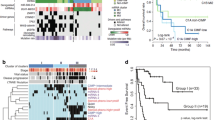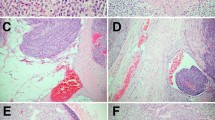Abstract
Background: Wnt/β-catenin signaling pathway activation plays an important role in adrenocortical tumorigenesis, but is only in part related to β-catenin activating somatic mutations. Recently, genetic alteration in AXIN2, a key component of the Wnt/β-catenin signaling pathway, has been described in adrenocortical tumors and specifically in adrenocortical carcinoma (ACC). Aim: To assess frequency and consequences of AXIN genes alteration on a large cohort of ACC. Patients and methods: Forty-nine adult sporadic ACC, with expression data available, in addition to both ACC cell lines H295 and H295R were studied. AXIN2 exon 8 hot-spot sequencing was performed on the entire cohort. AXIN1 entire coding region was studied on the 8 ACC with nuclear β-catenin staining. Results: The previously described AXIN2 in-frame heterozygous 12bp deletion c2013_2024del12 was found in 1 of the 49 ACC studied (2%), in a tumor with pSer45del activating CTNNB1 mutation and nuclear β-catenin staining. This heterozygous deletion was also found in the patient’s germline DNA, extracted from peripheral blood leukocytes. This genetic alteration was also present in H295 and H295R cell lines. The single-nucleotide polymorphism rs35415678 was found with an allele frequency similar to those found in reference populations. No correlation between AXIN2 expression, AXIN2 genetic variant or nuclear β-catenin staining was observed. No AXIN1 alterations were found in the 8 ACC studied. Conclusions: AXIN genes do not play a major role in ACC tumorigenesis and Wnt/β-catenin signaling pathway activation. AXIN2 germline variant c2013_2024del12 is likely to be a non-pathogenic polymorphism.
Similar content being viewed by others
References
Tissier F, Cavard C, Groussin L, et al. Mutations of beta-catenin in adrenocortical tumors: activation of the Wnt signaling pathway is a frequent event in both benign and malignant adrenocortical tumors. Cancer Res 2005, 65: 7622–7.
Gaujoux S, Tissier F, Groussin L, et al. Wnt/beta-catenin and 3′, 5′-cyclic adenosine 5′-monophosphate/protein kinase A signaling pathways alterations and somatic beta-catenin gene mutations in the progression of adrenocortical tumors. J Clin Endocrinol Metab 2008, 93: 4135–40.
Tadjine M, Lampron A, Ouadi L, Bourdeau I. Frequent mutations of Beta-catenin gene in sporadic secreting adrenocortical adenomas. Clin Endocrinol (Oxf) 2008, 68: 264–70.
Gaujoux S, Grabar S, Fassnacht M, et al. Beta-catenin activation is associated with specific clinical and pathologic characteristics and a poor outcome in adrenocortical carcinoma. Clin Cancer Res 2011, 17: 328–36.
Doghman M, Cazareth J, Lalli E. The T cell factor/beta-catenin antagonist PKF115-584 inhibits proliferation of adrenocortical carcinoma cells. J Clin Endocrinol Metab 2008, 93: 3222–5.
Ragazzon B, Libe R, Gaujoux S, et al. Transcriptome analysis reveals that p53 and ta-catenin alterations occur in a group of aggressive adrenocortical cancers. Cancer Res 2010, 70: 8276–81.
Gaujoux S, Pinson S, Gimenez-Roqueplo AP, et al. Inactivation of the APC gene is constant in adrenocortical tumors from patients with familial adenomatous polyposis but not frequent in sporadic adrenocortical cancers. Clin Cancer Res 2010, 16: 5133–41.
Chapman A, Durand J, Ouadi L, Bourdeau I. Identification of genetic alterations of AXIN2 gene in adrenocortical tumors J Clin Endocrinol Metab 2011, 96: E1477–81.
Liu W, Dong X, Mai M, et al. Mutations in AXIN2 cause colorectal cancer with defective mismatch repair by activating beta-catenin/TCF signalling. Nat Genet 2000, 26: 146–7.
Lejeune S, Guillemot F, Triboulet JP, et al. Low frequency of AXIN2 mutations and high frequency of MUTYH mutations in patients with multiple polyposis. Hum Mutat 2006, 27: 1064.
Yardy GW, Bicknell DC, Wilding JL, et al. Mutations in the AXIN1 gene in advanced prostate cancer. Eur Urol 2009, 56: 486–94.
Clevers H. Wnt/beta-catenin signaling in development and disease. Cell 2006, 127: 469–80.
Renkonen ET, Nieminen P, Abdel-Rahman WM, et al. Adenomatous polyposis families that screen APC mutation-negative by conventional methods are genetically heterogeneous. J Clin Oncol 2005, 23: 5651–9.
Taniguchi K, Roberts LR, Aderca IN, et al. Mutational spectrum of beta-catenin, AXIN1, and AXIN2 in hepatocellular carcinomas and hepatoblastomas. Oncogene 2002, 21: 4863–71.
Pedace L, Castiglia D, De Simone P, et al. AXIN2 germline mutations are rare in familial melanoma. Genes Chromosomes Cancer 2011, 50: 370–3.
Castiglia D, Bernardini S, Alvino E, et al. Concomitant activation of Wnt pathway and loss of mismatch repair function in human melanoma. Genes Chromosomes Cancer 2008, 47: 614–24.
Mostowska A, Biedziak B, Jagodzinski PP. Axis inhibition protein 2 (AXIN2) polymorphisms may be a risk factor for selective tooth agenesis. J Hum Genet 2006, 51: 262–6.
Khan NP, Pandith AA, Hussain MU, et al. Novelty of Axin 2 and lack of Axin 1 gene mutation in colorectal cancer: a study in Kashmiri population. Mol Cell Biochem 2011, 355: 149–55.
Satoh S, Daigo Y, Furukawa Y, et al. AXIN1 mutations in hepatocellular carcinomas, and growth suppression in cancer cells by virus-mediated transfer of AXIN1. Nat Genet 2000, 24: 245–50.
Zucman-Rossi J, Benhamouche S, Godard C, et al. Differential effects of inactivated Axin1 and activated beta-catenin mutations in human hepatocellular carcinomas. Oncogene 2007, 26: 774–80.
Author information
Authors and Affiliations
Corresponding author
Rights and permissions
About this article
Cite this article
Guimier, A., Ragazzon, B., Assié, G. et al. AXIN genetic analysis in adrenocortical carcinomas updated. J Endocrinol Invest 36, 1000–1003 (2013). https://doi.org/10.3275/9022
Accepted:
Published:
Issue Date:
DOI: https://doi.org/10.3275/9022




